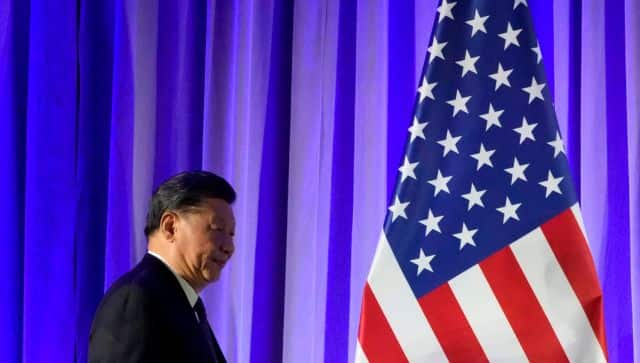In 2019, the United States’ Congress created the Space Force – a new branch of its military to handle threats in space – which was signed into law by then president Donald Trump. Now, it has been reported that Beijing has created its own ‘near-space’ command. The development comes months after the United States and Beijing had a stand-off over a Chinese spy balloon that entered US airspace. But what is it exactly? Let’s take a closer look: What is it? As per SCMP, the new command takes its place alongside the People’s Liberation Army’s army, air force, navy and rocket branches. The unit is reporting directly to the top level of the military and has access to hypersonic weapons.
The newspaper has not been able to independently verify the development.
It quoted researchers from the National University of Defence Technology as saying, “The near-space combat force is in the process of rapid development. The establishment of relevant units is not yet mature, and combat operations have not been standardised. The understanding of near-space combat command needs to be deepened.” “It is necessary to adjust the hierarchy of command and control powers, selection of command methods, implementation of executive orders and support for command communication.” The researchers, who submitted their report to the 11th China Command and Control Conference, claimed that near-space is a hotly-contested zone that could “determine the outcome of future battles”. “The near-space force operates in a special battlefield. Actions carried out in sensitive areas or over the territory of other countries may trigger political or diplomatic reactions,” they wrote. It is thus necessary “to shift the decision-making power upwards”, they added. “The highest military command can approve the scale of use, activity areas and method of use to avoid causing political and diplomatic nuisance,” the paper concluded. How would it work? As per WION, the space command would be locked on the opposing nation’s rocket sites. That would curtail their capability of launching anti-satellite missiles. “These attacks must be precise, overwhelming and merciless,” the paper states. [caption id=“attachment_13397382” align=“alignnone” width=“640”] The unit is reporting directly to the top level of the military and has access to hypersonic weapons. Representational image. AP[/caption] Researchers said critical infrastructure being lost would degrade the rival nation’s weapons infrastructure and tamp down its fighting spirit. “This could change the pace of battles and bring a major impact to how a war would end,” the researchers added.
The unit is reporting directly to the top level of the military and has access to hypersonic weapons. Representational image. AP[/caption] Researchers said critical infrastructure being lost would degrade the rival nation’s weapons infrastructure and tamp down its fighting spirit. “This could change the pace of battles and bring a major impact to how a war would end,” the researchers added.
They said that the ability to take some decisions would be given to the unit during a ‘hot-war’ scenario.
“This will place an additional burden on its commanders who would need to be able to plan and command the battlefield from a high position and with broad vision," they added. They also added that the unit would operate from ‘near-space’ – which begins around 20 kilometres above earth. Here, hypersonic weapons would play a key role. Victory will mainly be chalked up to “innovative strategies and combat tactics based on an in-depth analysis of the enemy’s weakness”, the researchers added. What do experts say? Experts say no one ought to be surprised. Space News quoted Defense Intelligence Agency (DIA) reports as saying that China is working on jammers to hit US military reconnaissance platforms and restrict communications. A piece in ORF noted that Beijing in particular is paying special attention to Near Space Flight Vehicles (NSFV) or Near Space Technologies (NST). “Beijing’s investment in NSFV is unsurprising given the range of military challenges confronting the country, which ironically, the PRC has invited through its aggressive conduct whether against India, Taiwan, the Philippines or the US,” the piece stated. The piece further said that in the months and years ahead, many countries will need to wake up to the fact that they will have to pour resources into NSFVs.
Some in the US top brass are worried.
General Chance Saltzman, chief of space operations for the US Space Force, told Nikkei recently that Beijing is making massive investments to counter what they see as Washington’s first-mover advantage in space. “The pace with which they’ve been able to put those capabilities in play, and the scale at which they are putting those capabilities, is the most alarming,” Saltzman said. Saltzman, a four-star general, said it is ‘fair’ to think China will target US space facilities in case of a conflict. [caption id=“attachment_13393232” align=“alignnone” width=“640”] China’s President Xi Jinping passes a US flag as he makes his way towards the podium at a dinner with business leaders during the Asia-Pacific Economic Cooperation (APEC) conference Wednesday. AP[/caption] The US wants rules to govern space to be established. “Until we establish those [rules] and get a commitment worldwide, globally, internationally, that says this is what acceptable behavior is [and] these are the norms of behavior in space, then they could always say, ‘Well, that wasn’t unsafe. That was just normal,’” Saltzman noted. The US is also planning to reach out to Japan to counter China. “Japan has been such a great partner over the years that I wanted the Space Force to be there and be able to act and interact on a routine basis with our counterparts in Japan, as a part of US Forces Japan,” Saltzman added. “They can’t just attack the US They have to say, ‘No, we’re willing to attack Japan and the US,’” Saltzman said. “Partnerships, in and of themselves, create deterrence because the country has to decide whether they’re willing to go to war against the whole world [and] because it’s not going to be a one-on-one situation.” With inputs from agencies
China’s President Xi Jinping passes a US flag as he makes his way towards the podium at a dinner with business leaders during the Asia-Pacific Economic Cooperation (APEC) conference Wednesday. AP[/caption] The US wants rules to govern space to be established. “Until we establish those [rules] and get a commitment worldwide, globally, internationally, that says this is what acceptable behavior is [and] these are the norms of behavior in space, then they could always say, ‘Well, that wasn’t unsafe. That was just normal,’” Saltzman noted. The US is also planning to reach out to Japan to counter China. “Japan has been such a great partner over the years that I wanted the Space Force to be there and be able to act and interact on a routine basis with our counterparts in Japan, as a part of US Forces Japan,” Saltzman added. “They can’t just attack the US They have to say, ‘No, we’re willing to attack Japan and the US,’” Saltzman said. “Partnerships, in and of themselves, create deterrence because the country has to decide whether they’re willing to go to war against the whole world [and] because it’s not going to be a one-on-one situation.” With inputs from agencies
)